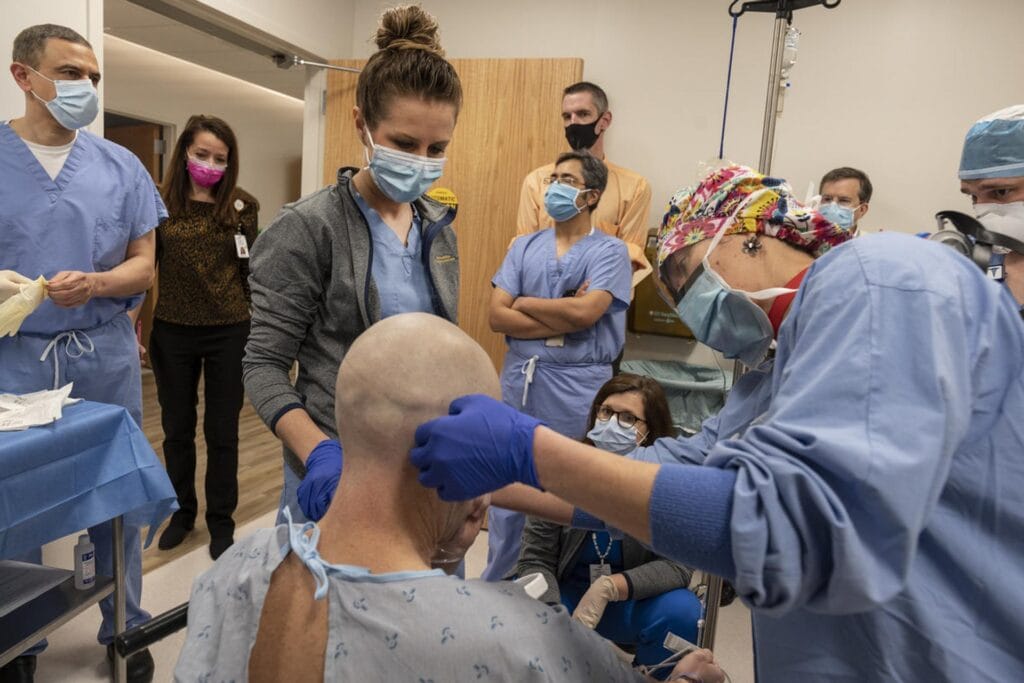On the heels of the country’s deadliest year for drug overdoses, the West Virginia University Rockefeller Neuroscience Institute launched a first-in-the-world clinical trial to investigate the use of focused ultrasound technology to treat those with opioid use disorder. The procedure marks the potential for a new innovative treatment for addiction.
The goal of the study, conducted in collaboration with Insightec, is to evaluate the safety and potential of focused ultrasound in reducing substance cravings and addictive behaviors.
During the 30-minute procedure, RNI researchers applied focused ultrasound waves to the nucleus accumbens, a key structure in the brain involved in addiction and anxiety. The research team utilized visuals of drug use and drug paraphernalia to induce cravings prior to and during the procedure. While preliminary, RNI investigators were encouraged by the patient’s positive behavioral response to the focused ultrasound and plan to further investigate the treatment by enrolling additional patients in the study.
The study’s first participant, a 39-year-old business owner from West Virginia, is currently enrolled in WVU’s Comprehensive Opioid Addiction Treatment program. He has an over 15-year history of substance use disorder, specifically with prescription opioids, heroin and cannabis, and safely and successfully underwent the focused ultrasound procedure in February 2021.
“COVID-19 has tragically intensified our nation’s addiction crisis,” Dr. Ali Rezai, RNI executive chair and principal investigator of this study, said. “We need to explore technological innovations such as focused ultrasound to help patients and families impacted by addiction. At the RNI, we are routinely using focused ultrasound as an FDA-approved procedure to treat tremors and are conducting clinical trials to explore its potential for treating Alzheimer’s disease and brain tumors.”
Recently released data from the Centers for Disease Control and Prevention show the country’s addiction epidemic worsening during COVID-19. More than 81,000 Americans died from overdose in the 12 months leading up to May 2020, the highest one-year figure in recorded history.
In addition to focused ultrasound, the WVU team is exploring a range of new technologies to treat addiction that includes deploying the use of wearables and artificial intelligence, transcranial magnetic stimulation and deep brain stimulation. In 2019, the RNI launched a first-in-the-U.S. clinical trial exploring the use of deep brain stimulation to treat addiction, which has helped its first patient celebrate more than a year of sobriety after an 18-year battle with substance use.
“We were all impressed with the patient’s bravery to help explore new treatment options for substance use disorder. While the current treatment options for substance use disorder work for many, they don’t work for everyone for a variety of reasons,” James Mahoney, RNI addiction researcher, clinical neuropsychologist and assistant professor in the WVU Department of Behavioral Medicine and Psychiatry and Department of Neuroscience, said. “We need to continue exploring new treatments for those struggling with addiction, and I’m hopeful that focused ultrasound technology will provide another tool to assist those in need moving forward.”
“Clinical research and scientific discovery using the therapeutic power of acoustic energy are helping to transform lives,” Dr. Maurice R. Ferré, chair and CEO at Insightec, said. “We are excited to continue supporting our partners to pioneer focused ultrasound treatments in the brain for critical diseases like addiction.”
Insightec’s Exablate Neuro uses focused ultrasound guided by magnetic resonance imaging technology and is FDA approved to treat tremor from essential tremor and Parkinson’s disease. The company is also working with RNI investigators on first-in-the-U.S. trials of transient opening the blood-brain barrier to treat Alzheimer’s disease, which has shown a reduction in Alzheimer’s plaques in early results.













